25 What is SEO?
Search Engine Optimization (SEO) is a set of strategies that can be used to make a website, web page, or blog post appear high in Search Engine Results Pages (SERPs).
Think about a time when you have needed to find information on the internet. You’ve likely visited Google or Bing (search engines) and typed into the search bar a word or phrase representing what you are looking for (user query). For example, in Figure 1 below, I have typed a query, “SERP,” into the search bar in order to find out what SERPs are. What happens once I search? The search engine presents me with a page that includes links to top results (hence, the Search Engine Results Page). Figure 1 shows the first page of the results for my SERP search, with the user query and first result labeled in blue and yellow, respectively.

So, essentially, SEO includes a variety of strategies that a web writer or coder might use to get their own website to be ranked high in a SERP. It’s important to note that you may also find what is called a “featured snippet” (labeled in purple in Figure 1) on the SERP. Snippets are short excepts drawn from a web page that is ranked highly by search engines. Snippets are so popular that users don’t even have to click to the subsequent website to find the information they need. (More on snippets later!)
You may be wondering, though, if SEO is a set of practices or strategies to achieve high rankings, what are those strategies? There are many strategies, such as embedding keywords naturally into headings, that help writers achieve SEO. However, before you can understand the importance of these strategies, you will first want to understand the algorithms that influence search engine results.
a. SEO Algorithms
SEO is determined by a search engine’s algorithm, and each search engine has a slightly different algorithm–which means that if you search for a keyword in Google and search for that same keyword in Yahoo, you may get different top results. However, the results often do not vary drastically.
Search engine companies such as Google do not typically reveal all of the factors that influence their SEO algorithm. Yet, in recent years, many have become more transparent about how their practices work. Currently (October 2021), Google’s Ranking Results page highlights factors that influence search engine results:
- Meaning of your query
- Relevance of webpages
- Quality of content
- Usability of webpages
- Context and setting
Google notes that the content on your webpage needs to be relevant to the user’s search query in order for the page to get ranked high in its results. This is why one of the first things writers are taught about SEO is to use a variety of keywords on a webpage. By doing so, writers signal to the algorithm and to readers that the content is relevant. The algorithms are able to discern if users find content relevant by gleaning factors such as how long a user stays on a web page before moving on.
As web designers and web writers work to ensure that their content is of good quality and their webpages are usable, they are automatically working towards effective SEO. However, true SEO experts have specific tactics to help achieve these goals.
b. SEO Strategies
As web writers consider the factors that influence the SEO algorithm so their pages get ranked highly, they can use a variety of strategies to ensure the their page outranks a page or website on a similar topic.
Let’s consider the “quality of content” factor that Google notes is part of its algorithm. What might you do as a writer to “convince” an algorithm that your content is of good quality?
Search engines prioritize the reliability and trustworthiness of the content on a website. Of course there are some things that you as a web writer have minimal control of in this category. For instance, algorithms prioritize websites that are linked to from other prominent websites. So, if you were ever able to get the New York Times to link to your blog, you’d be set! If you’re not quite there yet, you can still influence the algorithms. How so? Here are a few examples:
- You can make sure to reference and link out to other high-quality sources in your own web writing.
- You can edit for grammatical correctness and spelling errors. While there are debates as to whether or not this fine-tuned level of detail influences SEO algorithms, it definitely influences how long users stay on your site. And how long users stay on your site influences the ranking of your page.
- You can use keywords throughout the page. Keywords are words or phrases that users are likely to type into the search bar as they are searching for relevant content. If you have keywords on your site (used naturally rather than thrown in after every other word), users are likely to stay on the page longer because they are reading your content and find it helpful in their search. This signals to the algorithm that your page is worthwhile.
Now that you have a general sense of the factors that influence SEO algorithms and the strategies that enhance those factors, we will begin to dig deeper into a variety of recommended strategies. However, before we do so, let’s explore why SEO matters.
SEO is...

